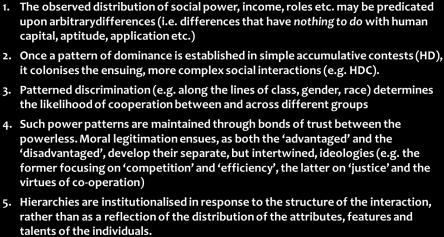Varoufakis on game theoretic analysis of asymmetric expectations among the powerful & the powerless March 22, 2014
Posted by larry (Hobbes) in economics, Game Theory, Psychology, social justice.trackback
This is for those who have some experience, knowledge or interest in game theoretic analyses of social interaction. Varoufakis is a political economist who is intimately familiar with game theory, having written a book about it with Hargreaves Heap some years ago. Nevertheless, economically, this research falls within the domain of what has become known as microeconomics, as distinct from macroeconomics. But this research focuses on social group expectations, not the processes of the economic system as a whole.
There are links in the paper to more detailed and mathematical discussions of the issues. I don’t think that the PowerPoint slides are self-explanatory, as they assume more understanding of the mathematics underlying game theory than is perhaps possessed by the general population. But the conclusions Varoufakis reaches require no math to understand. They are:
There are a number of books and articles dealing with applications of game theory to biological situations, one famous one by the late John Maynard Smith, Evolution and the Theory of Games, mentioned by Varoufakis. I think I should point out that Richard Lewontin, the population geneticist, has written that he thought that the appropriation of game theory to evolutionary contexts altered the character of the theory to such an extent that it ought to be called something other than “evolutionary game theory”. History and social convention have made the decision for him. The appellation has stuck.
To be fair to Varoufakis, he doesn’t think that these results are extraordinarily original, though they would seem to be unknown to mainstream economists, whose theoretical paradigm Varoufakis is concerned to attack. And he feels that one of the best ways of doing this is from within, as it were, a tactic utilized successfully by logicians for centuries to attack positions they don’t (didn’t) like. (Have a look at the way Socrates, as set out by Plato, operates.)
Here is the link to a non-technical discussion of this topic, including links mentioned.
Reprise
Getting back to my simple example of being able to breathe, we know that the presence of oxygen is a necessary though not sufficient for breathing. We also know that the presence of CO2 is a necessary but not sufficient condition for breathing.
So, here we have two necessary conditions for breathing. For B for breathing, O for oxygen, and C for CO2, we have (if B, then O) and (if B, then C). Since we know that they must occur together for a person being able to breathe, we have (if B, then C & O).
Realizing that the system under discussion is more complex than this discussion, can we nevertheless go on to contend that the presence of oxygen and CO2 are individually necessary and jointly sufficient for breathing? That is, that B iff C & O? How should we then interpret this equivalence? As a kind of “law of breathing”, a kind of scientific regularity, or as a definition of the conditions of being able to breathe?
This question may seem to be a triviality, but it arises in the discipline of macroeconomics all the time. When is a statement to be interpreted as a substantive assertion that has a truth-value or as a definition of terms, which has no truth-value but is only useful or not? Too many economic discussions are not at all clear about this issue. And it can make a difference to how you treat what they are saying.

Comments»
No comments yet — be the first.